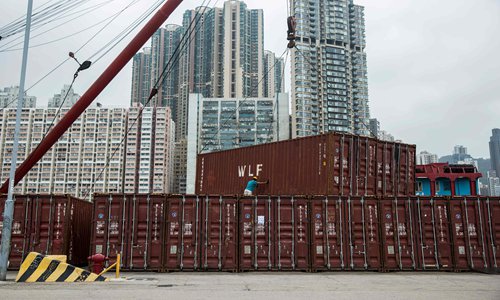Hong Kong's role as an international shipping center buoyed by mainland firms and capital: industry leader
HK’s global shipping sector resilient despite challenges: industry leader

A worker assists shipping containers as they are stacked on a pier in Hong Kong in October 2018. Photo: VCG
Hong Kong remains resilient as a world shipping center buoyed by the strong support of companies and capital from the mainland, even though global trade continues to be shadowed by logistic snags, inflation and the epidemic, Gary Lau, chairman of the Hong Kong Association of Freight Forwarding and Logistics, told the Global Times.
In an interview ahead of the 25th anniversary of Hong Kong's return to the motherland, Lau said that while the political events in recent years have caused many doubts about Hong Kong, confidence in the city's future development remains solid thanks to the momentum from the mainland.
"Many companies still believe that Hong Kong's economic development is inseparable from the mainland and has great potential and advantages, so their confidence in Hong Kong has not been shaken," Lau said.
The trade and logistics industry remains a major pillar of Hong Kong's economy, accounting for about one-fifth of the GDP. Backed by the vast mainland market, shipping has long been the core business of Hong Kong, and its container throughput has ranked first in the world for many times.
In recent years, the increasingly fierce market competition has impacted Hong Kong's container throughput, while the epidemic situation in the city led to the drop of the port cargo and container throughput in the first quarter by 13.8 and 9.9 percent year-on-year.
But the city's role as an international shipping center remains resilient, given its strong connectivity with the mainland, a booming high potential market leading the global economic recovery.
"Companies and capital from the mainland have played a positive role in the development of Hong Kong's international shipping center as the strong export demand for mainland manufacturers from all over the world has driven Hong Kong to become a major hub port for international transit," Lau said.
Meanwhile, foreign investment in Hong Kong continues to increase and investors will continue to set up regional headquarters in Hong Kong. For example, the BIMCO, the world's largest international shipping association, announced in September 2020 that Hong Kong was listed as the fourth designated place of arbitration, demonstrating that the city has successfully entered the list of the world centers for international maritime arbitration.
This came just a year after the International Chamber of Shipping established its China office in Hong Kong in 2019 as the world's first office outside its London headquarters.
Hong Kong International Airport has also sustained its role as being an international aviation hub, connecting more than 220 countries and regions around the world, and with more than 1,100 flights between Hong Kong and the rest of the world every day.
"Over the past years, we are most proud of the fact that Hong Kong International Airport has been ranked as the busiest hub for international air cargo," Lau said.
Although the importance of Hong Kong as a transit port has been weakened, as mainland ports rise to prominence, Lau said that it does not mean that Hong Kong's role in sea and air transportation had become blurred.
On the other hand, the Greater Bay Area has provided greater advantages for Hong Kong in competition than other places in the world. In line with the construction of the Guangdong-Hong Kong-Macao Greater Bay Area, the mobilization of sources of goods and the sharing of regional supporting facilities can allow flexible deployment of logistics and freight, Lau said.
Hong Kong's shipping industry can make use of its professional capabilities, rich experience, talent pool, location, and financial and legal strengths to further complement the advantages of the mainland, experts said.



